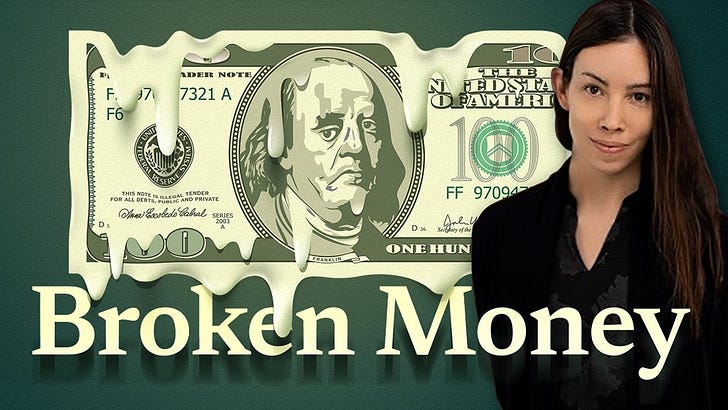Lyn Alden: How Money & Banking Work (& why they're broken today)
In this 30-minute explainer video, Lyn Alden takes a step back through history and looks into the intricacies of money and banking, offering an answer to an overlooked but extremely important question: What is money?
It's a pretty good video that introduces the viewer to money and how it and banking have developed over time.
What’s Driving the Global Gold Rush?
A recent surge in the gold price is symptomatic of a changing world order and the onset of a new age of conflict and uncertainty. Governments and central banks have long viewed the precious metal as a potential source of monetary stability and economic security, and this time is no exception.
Much of the heightened demand for gold is driven by central banks. China, which had relatively small gold reserves of 395 tons in 2000, now has 2,260 tons. Notably, it increased its stock of gold substantially in 2009 and 2015, which we now know to be watershed years for a world that was becoming more skeptical about globalization. Russia and Turkey, too, started building up massive war chests after 2015, and the same trend is also evident more recently in the European Union, where the Czech Republic and Poland have both been augmenting their reserves.
Foreign central banks continue to be the primary buyers of gold. Why? They want to diversify away from the US Dollar. Whatever your feelings are on the US and EU sanctions on Russia, a message was sent to everyone worldwide. If you pursue policies that the US and its allies do not like, we will use financial weapons, including freezing and attempting to confiscate your dollar-based holdings.
I would say the message was received, as various governments have been selling off dollar reserves and replacing them with gold at a record pace for the past three years.
Stanley Druckenmiller: Why we're spending like we're still in the great depression is beyond me
Good interview with one of the greats. The government is spending too much money that we do not have. This excess spending is helping to cause inflation and precluding any recession that would help cleanse the system. But hey, it's an election year, so they will spend.
Did I sell Argentina too early?
As an advocate of sound fiscal policy and a strong believer in the power of free markets, I find Argentina’s recent economic overhaul under President Javier Milei not just refreshing but essential in today’s world of bloated government spending.
Since taking office in December 2023, the libertarian leader has had to make some hard choices to stabilize Argentina’s economy, which has long been beleaguered by high inflation and overspending. His “shock therapy” approach, deeply rooted in free market principles and fiscal restraint, could serve as a blueprint for other nations grappling with similar economic ailments, including the U.S.
Milei’s strategy hinges on two critical pillars: fiscal reform and monetary stabilization. By addressing the country’s chronic overspending, his administration achieved a noteworthy milestone—a budget surplus in the first quarter, the first since 2008.
High-profile endorsements have rolled in five months since Milei took office. Following a meeting with the Argentine president in Los Angeles, Tesla CEO Elon Musk tweeted to his 182 million followers that he recommends investing in Argentina. Similarly, billionaire investor Stanley Druckenmiller, after listening to Milei’s speech at Davos, described the president as the world’s sole free market leader today and disclosed investments in five Argentine companies.
Before the presidential election in Argentina, I bought a basket of Argentinian stocks. However, as the second round of the election approached, I second-guessed myself and thought that even if Milei won, his policies would be held up in Congress as his party did not have a majority.
I was wrong, as the political class is going along with reforms. I still have a position in the large state-owned oil company YPF that I bought a while ago.
I told subscribers I had made an impetuous decision by second-guessing my original idea and overthinking the possible outcomes of the election. Any way I will keep an eye on what is happening there as the changes that are happening are amazing. We will see if the reforms kick into improving voters lives before their patience with austerity runs out.
Buffett, holding cash, can’t find anything cheap to buy
At the recent Berkshire annual meeting, Buffett said he couldn’t find anything effective to put the company’s cash hoard of $183 billion into. 5% on T-Bills isn’t bad!
There are cheap areas of the markets. The problem for Berkshire is that to move the needle, they need to make big bets. You will likely not see them in oil field services or uranium mining companies. The market caps are just too low to make a difference.
Once there is a significant market drawdown, they will put their money to work. That has been their playbook for years and it has worked.
This service and my work are reader—and listener-supported. The best way to support me is to follow me on Substack, YouTube, and X. You can also buy me a coffee if you are inclined.
That’s it for this week. Thanks for subscribing!
John Polomny






“5% on T-Bills isn’t bad!” That’s at least a -5% real return. Can’t do that forever. He should take his Father’s advice and own some Gold.
Argentina energy companies PAM, YPF and VIST were my largest holdings.
Still holding some now but I sold most back in the Fall —I too was thinking Milei would be blocked by the Peronists/Socialists.
I’m more Argentina optimistic now. Can you post a non-paywall link to, or tell us here, the Drunkenmiller purchases?
I’m not seeing any on his 13F.